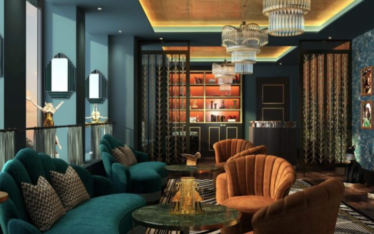In the ever-evolving landscape of social media trends, staying ahead of the curve is paramount for hotels aiming to capture the attention of potential guests.
From the integration of artificial intelligence (AI) becoming commonplace to the resurgence of long-form content, the year ahead is not just about keeping pace – it’s about embracing adaptability and authenticity. And, as it always is with social media, the call is loud and clear: keep up or risk getting left behind.
Whether you’re a hybrid hotel looking to boost bookings or an established hospitality group hoping to build a buzz around your brand, staying in tune with the current trends is essential to outshine your rivals.
Keep reading for the 7 social media trends your hotel needs to adapt to your social media strategy in 2024.
How long do social media trends last?
Social media trends can be as fleeting as a sunset – they come and go in the blink of an eye (TikTok trends, we’re looking at you). What’s trending on social media today can be very different from what will be in a week – the lifespan of each trend can vary, from just a few days to several months.
While some trends enjoy a prolonged moment in the spotlight, the majority tend to be brief, making it essential for hotels to strike a balance between embracing what’s current and building a timeless brand identity.
Why are trends relevant to your hotel brand?
The lifespan of a current trend directly influences your hotel’s ability to engage with current and prospective guests. By understanding how long these trends typically stick around, hotels can strategically align their marketing efforts, ensuring they don’t invest in yesterday’s fad while missing out on the next big thing.
It’s a delicate dance between embracing what’s hot now and anticipating what will endure, ultimately shaping your online presence and influencing guest perceptions of your brand.
Social media marketing trends hotels need to know in 2024
The new search paradigm
This year, the lines between social media and traditional search engines are not just blurring – they are being redrawn.
Users, in particular Gen-Z, are increasingly bypassing Google and Bing, opting instead to search on the dynamic, content-rich environments of social networks. Platforms like Instagram, TikTok and Little Red Book have transformed into powerful search tools, catering to a generation that values quick, visual, and interactive content over the static results of traditional search engines.
The appeal of social media as a search tool lies in its format and immediacy. Users engage with brands through direct searches, explore curated pages, and dive into trends via hashtags, with short-form video in particular offering quick, engaging snippets of content. Comment sections add layers of interaction and authenticity and the endless scrolling feature on social media platforms provides a seemingly endless stream of inspiration and discovery.
This evolution represents a monumental opportunity for hotels and hospitality brands to capture attention in a space where consumers are already congregating and engaging. It also necessitates a strategic rethinking of marketing approaches – a dual approach strategy to search is now essential to ensure your brand remains visible.
Hotels must build their presence on social media while continuing to refine their SEO tactics to capture the segment of the market still reliant on traditional search engines.
AI integrations will become the norm
As we enter 2024, there’s no doubt that the AI social media trend will continue to grow. 2023 was the first year that AI really started to come into its own, but many brands were also hesitant to adopt it into their marketing strategies. But in 2024, this is predicted to change; with AI software and tools being more commonly used.
However, it’s important to view AI as a powerful ally in the realm of social media marketing rather than a replacement for human creativity and ingenuity. While the efficiency and precision of AI-driven tools like Chat GPT for crafting captivating captions or Shutterstock AI for generating visually appealing images cannot be denied, the true magic happens when human creativity collaborates with these technologies.
That is why marketers need to foster a symbiotic relationship between AI and human intuition. Brands should encourage their marketing teams to explore creative ways to utilise AI tools as a springboard for inspiration rather than a crutch. After all, successful social media marketing lies in the ability to strike a chord with the audience emotionally – something that AI, for all its capabilities, cannot replace.
AI in hotel marketing
Indeed, AI’s potential to enhance efficiency and guest experience is undeniable – it will revolutionise everything from customer service to personalisation. Generative AI tools and chatbots promise quicker responses to guest inquiries, while AI-powered analytics can tailor offerings to individual guest preferences.
However, there’s a big misconception that needs addressing: the idea that any AI solution, regardless of its specificity or customisation, will be a silver bullet for hotel marketing challenges.
This one-size-fits-all mindset is where many hotels could stumble. Implementing AI tools without a strategy that’s tailored to the specific needs of a hotel and its guests, will lead to poor outcomes. It’s akin to using a powerful engine in the wrong vehicle – the potential is there, but the execution may fall flat.
For AI to be truly effective in the hospitality industry, it needs to be more than just a plug-and-play solution. It requires thoughtful integration into the hotel’s unique ecosystem.
For instance, a chatbot might be a great addition to customer service, but if it’s not programmed to understand and respond accurately to the specific queries and language of your hotel’s clientele, it could lead to frustration rather than improved service.
Moreover, over-reliance on AI can overlook the crucial element of a human touch that is so essential in hospitality. AI is excellent for handling repetitive tasks and analysing data, but – like any new technology – it cannot replace the personal connection that human staff bring to guest interactions. The key is to find the right balance – using AI to enhance efficiency and insights, while keeping human empathy and understanding at the forefront of guest interactions.
How to harness AI
Before jumping on the AI bandwagon, hoteliers should conduct a thorough needs analysis to understand where AI can genuinely add value.
- Seek AI solutions that offer customisation to align with specific brand values and guest expectations.
- Ensure staff are trained to work alongside AI tools, harnessing their benefits while providing the irreplaceable human element.
- Regularly review and adjust AI implementations, using guest feedback and data analytics to refine their effectiveness.
Long-form content makes a comeback
Last year, the social media landscape witnessed a notable shift towards the resurgence of long-form content and this looks set to continue in 2024.
While short-form content, particularly around trending audio, has dominated platforms like TikTok and Instagram in recent years, it’s becoming clear that a comprehensive strategy goes beyond mere reliance on fleeting trends. The expectation is for creators and brands to elevate their game by embracing longer and more original content.
This shift is not only evident in the evolving video landscape, with content stretching beyond the conventional 15 or 30-second durations, but it also aligns with the continued popularity of long-form content on platforms like YouTube.
As hotel brands navigate this trend, the challenge lies in seamlessly incorporating long-form content while staying attuned to evolving trends. Adapting to this paradigm shift becomes imperative for hotel brands in 2024, as it offers a unique opportunity to engage audiences on a deeper level and showcase the diverse facets of their offerings beyond the confines of shorter, trend-centric posts.
How to utilise long-form content for your hotel’s social media
- Virtual tours and behind-the-scenes: create engaging video tours that go beyond showcasing rooms. Take the audience behind the scenes of the hotel, introducing staff members, highlighting the kitchen, and exploring unique features or amenities. This personal touch provides an immersive experience, allowing potential guests to connect with the hotel on a deeper level.
- Day-in-the-life series: develop a series of day-in-the-life vlogs featuring different staff members, from the concierge to the chef. These videos can provide insights into the daily operations of the hotel, giving viewers a sense of the personalities and dedication of the people behind the scenes.
- Local exploration guides: craft long-form video content that explores the local area surrounding the hotel. Highlight nearby attractions, restaurants, and hidden gems. This not only showcases the hotel’s location but also positions it as a guide for guests looking to make the most of their stay.
- Customer testimonials: feature longer video testimonials from satisfied guests. Allow them to share their experiences in detail, discussing not only the amenities but also the personal touches that made their stay memorable. This authentic content can build trust and credibility.
Embracing authenticity and lo-fi content
In the realm of social media marketing, especially as we navigate through 2024, there’s a distinct shift from the polished, flawless imagery of yesteryears to a new era of authenticity and relatability.
This transformation resonates profoundly with younger generations who are drawn to content that feels genuine, spontaneous, and less filtered – think Instagram photo dumps and candid TikTok vlogs. For hotels, this trend presents an opportunity to connect with audiences in a more meaningful and trustworthy manner.
The Decline of the ‘Perfect’ Image
For a long time, hotel marketing heavily relied on showcasing immaculate, meticulously curated visuals. While these images captured the aspirational aspect of travel, they often lacked the personal, relatable touch that modern social media users crave. Today’s audience values real experiences and behind-the-scenes glimpses that portray the authentic essence of a place.
The Power of User-Generated Content (UGC)
Stackla’s findings that 79% of consumers are significantly influenced by UGC in their purchasing decisions cannot be overlooked. Hotels can encourage guests to share their real experiences, be it a sunrise from their balcony, a candid moment at the hotel’s dining area, or an impromptu hotel tour. Reposting this UGC not only adds credibility but also builds a community of engaged, real-world advocates for the hotel’s brand.
Practical steps for how hotels can jump on this 2024 social media trend:
- Encourage and share real guest experiences: motivate guests to share their honest experiences at the hotel. Repost these moments on the hotel’s social media channels to showcase authenticity.
- Behind-the-scenes content: share the everyday workings of the hotel – from the hustle of the kitchen to the meticulous process of room preparation. This transparent approach can create a deeper connection with the audience.
- Embrace the unpolished: shift from overly edited photos to more natural, in-the-moment snapshots. Showcase the hotel in different lights, weather, and real-life situations.
- Storytelling over selling: use social media platforms to tell stories – about the people, the locale, and the unique experiences that the hotel offers. Let the narrative drive the engagement rather than hard-sell tactics.
- Engage with the audience: actively engage with followers in comments, direct messages, and through interactive content like polls or Q&A sessions. This two-way communication fosters a sense of community and trust.
Social commerce continues to rise
Arguably one of the biggest upcoming current trends in the social media space, social commerce is anticipated to gain significant traction in 2024, redefining how social media users interact with products and services.
Trends indicate that platforms like Instagram and TikTok (which saw huge success last year with TikTok Shop) will further integrate eCommerce functionalities into their platforms, enabling users to make seamless purchases directly within their apps.
This evolution is not merely a convenience for consumers – it represents a powerful opportunity for businesses to tap into new customer bases and enhance overall sales. Recognising the potential of social commerce and strategically leveraging it will be essential for businesses seeking to stay ahead in the digital marketplace.
How is this relevant to hotel brands?
The future of social commerce holds immense potential for hotel brands, and platforms like LiBi are at the forefront of this transformative shift in the hospitality industry.
Designed specifically for hotel and rental owners, as well as their guests, LiBi introduces a seamless integration of lifestyle brands and local products into the social media experience. By creating an environment where users can effortlessly browse and purchase curated offerings, platforms like LiBi are paving the way for a new era in hospitality marketing.
What about bookings?
As social media users become increasingly comfortable making purchases directly through these platforms, a natural progression emerges which means that potential guests will find themselves more at ease booking hotels directly through social media channels and ads.
This evolving trend not only enhances the convenience for users but also presents a lucrative opportunity for hotel brands to expand their reach and streamline the booking process, fostering a more direct and engaging connection with their audience.
Influencer marketing is changing
The world of influencer marketing in the hospitality industry is witnessing a significant evolution. Gone are the days of one-off posts and fleeting collaborations. The new trend is forging long-term, meaningful partnerships with influencers. This shift reflects a deeper understanding of the value influencers bring, not just as content creators but as key players in a brand’s extended narrative.
The move towards ongoing collaborations with influencers marks a strategic shift in the hotel marketing arena. These enduring partnerships bring a host of benefits: they allow for the development of more cohesive and authentic storytelling, foster a deeper connection with the influencer’s audience, and build a sense of trust and reliability around the brand. For hotels, this means working with influencers who genuinely resonate with their brand values and ethos, transforming them from mere promoters to brand ambassadors.
Another critical aspect of influencer marketing in 2024 is the repurposing of influencer-generated content across various marketing channels – an approach that significantly amplifies the ROI of influencer collaborations. A single influencer post can be repurposed for social media ads, featured on the hotel’s website, or integrated into email marketing campaigns. This multi-channel utilisation not only extends the reach of content but also creates a cohesive brand experience across all guest touchpoints.
Quality Over Quantity
The emphasis has shifted from quantity to quality. Hotels are now more interested in the quality of content influencers produce and their ability to connect with niche audiences. This focus on quality ensures that the content is not only engaging and authentic but also aligns perfectly with the hotel’s branding and marketing goals.
Action Steps for Hotels
To capitalize on these evolving trends, hotel marketers should:
- Identify and partner with influencers whose brand and audience align with their own.
- Negotiate long-term partnerships that go beyond one-time posts to include a series of coordinated content pieces.
- Plan for multi-channel utilization of influencer content, ensuring it aligns with broader marketing campaigns and narratives.
- Focus on the quality of partnerships and content rather than sheer numbers, targeting influencers who can engage effectively with niche segments.
Adaptability is key to a successful strategy
In 2024, the effectiveness of social media in hotel marketing will depend on a brand’s ability to adapt to each platform’s specific demands. The era of blanket posting across all platforms is officially over, making way for a more strategic, tailored approach.
In the early days of social media marketing, posting the same content across various platforms was commonplace. Now, this strategy is increasingly seen as outmoded and can even be counterproductive. Each social media platform has its own language, user expectations, and content format, which necessitates a more nuanced approach.
To stay relevant in 2024’s social media scene, hotels need to invest in creating platform-specific content. This means understanding the nuances of each platform and crafting messages that resonate with each audience segment. It’s not just about repurposing the same content – it’s about reimagining it to fit the context of each channel.
Action Steps for Hotels
Hoteliers looking to refine their social media strategy should conduct a platform-wise audit to understand where their content is performing best and why, and then develop a content strategy that aligns with the unique style and audience of each platform.
From there, you can experiment with different content types (e.g., behind-the-scenes tours on Instagram, guest testimonials on Facebook, industry insights on LinkedIn) to see what resonates best with each audience.
As always, monitor your engagement metrics closely to continually refine and adapt your approach.
Need help adopting these current social media trends into your marketing strategy?
If you find the prospect of incorporating these trends into your marketing strategy a bit overwhelming, don’t worry – you’re not alone!
At Stay The Night, we specialise in navigating the ever-evolving landscape of social media marketing for our clients (which include some of the world’s leading hotel brands). Our team is here to ensure that your hotel not only keeps up with the latest trends but leads the charge in setting new standards. Email hello@staythenight.net to chat about how we can support you.
Want more hotel industry insights along with interviews with leaders from global brands? Sign up to our email newsletter here.



